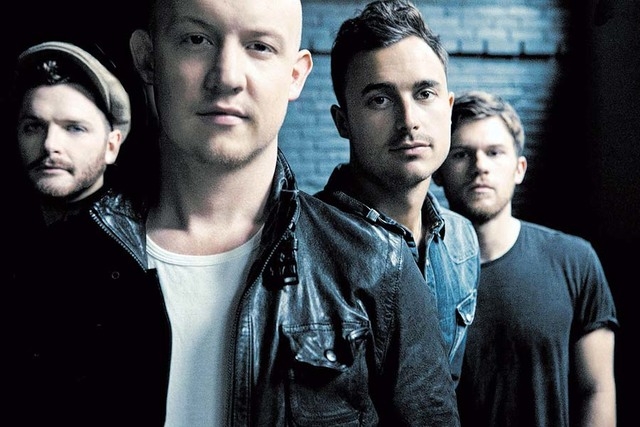The Fray band together
Isaac Slade’s voice gives The Fray a home base from which to go exploring. But not too far.
Being in a mainstream rock band seems like a thankless job these days, when the focus of everything from TV talent shows to country, pop and hip-hop seems to be on the individual.
“I see those guys sometimes and I get jealous that they can just kind of do whatever they want,” says Slade, the voice and pianist for the quartet visiting Red Rock Resort for an outdoor show Saturday.
But he’s not interested in following the confusing path of singers who blur the lines between their bands and solo fame, such as Jakob Dylan and the Wallflowers, Rob Thomas and Matchbox 20 or Aaron Lewis and Staind.
“It is a lot easier in some sense to be a solo artist because you get to call the shots and live in a dictatorship rather than a democracy,” he concedes. “But living in a democracy has its distinct advantages, one of them being stability. If I was the only one calling the shots, I don’t know if I’d be talking to you today. I would be playing a coffee shop in some suburb of Denver, pouring my heart out but certainly not making any money.”
Instead, Slade drummer Ben Wysocki and guitarists Joe King and Dave Welsh have weathered eight years between their 2005 breakout single “Over My Head (Cable Car)” and their fourth album, “Helios.”
“We’ve gotten here because four guys, four distinct personalities have led this group to where it is today,” Slade says. He’s seen solo artists who have “begun to believe the lie,” but “my bandmates would completely not allow that. They keep my feet planted firmly on the earth.”
Speaking of rock star ’tude, Entertainment Weekly recently bemoaned the lack of it. A piece about “mock stars” claims pop tarts and rappers steal all the bad-boy notoriety, while rock is suffering a “charisma deficit” in bands such as Bastille, (Las Vegas’ own) Imagine Dragons and One Republic, whose Ryan Tedder co-wrote and produced The Fray’s new single “Love Don’t Die.”
Slade, the son of missionaries, said he understands the era when self-destructive lead singers were “a built-in publicity machine.” But it doesn’t bother him that “the focus in music shifted to the songs, the message.”
“We want to be known, but we want to be known for our music, not for some stupid publicity stunt or some weird nonmusical, press-friendly item.”
The first two Fray albums defined the group’s sound: Slade’s urgent, confessional vocals anchored by dominant piano lines. But 2012’s “Scars and Stories” shook things up by bringing in producer Brendan O’Brien, who helmed iconic ’90s albums by Pearl Jam and Rage Against the Machine.
“He’s just a hero of ours,” Slade said, and aided the group’s “very conscious effort to go back to the late-’90s college rock we grew up on.” And it was O’Brien who told Slade, “As long as my voice is singing, it will sound like The Fray, so have at it.”
The album was met with mixed reactions and in retrospect was “maybe a little too self-indulgent,” he says. This time, the group “very purposely sought out” Stuart Price, the British producer who brings his electronic dance music background to the likes of Madonna and Las Vegas rockers The Killers.
“Now we feel like we have a firm enough foundation to step forward,” Slade says. “I’m thrilled about where this record ended up, kind of in the constellation of today’s pop landscape, between dance and Katy Perry and Imagine Dragons, and even the Coldplays and all that stuff.”
“How to Save a Life” remains the group’s biggest hit and the unofficial theme of “Grey’s Anatomy” after a 2006 episode of the ABC medical drama incorporated it. That song and others have since underscored the likes of “Criminal Minds” and “The Vampire Diaries,” even the movie “Transformers: Revenge of the Fallen.”
Slade says that so far, TV and movie producers still discover The Fray’s songs rather than commissioning them earlier in the process. The group did take a stab at the end-credits song for “Ender’s Game.”
“I’ve been a huge fan of that book for a long time. I read it when I was a kid,” Slade says. So he was “bummed” when the song “Weight of the World” wasn’t chosen.
Spending the summer on the road will keep the band out of the studio anyway.
“It’s like two completely different lives that we have,” Slade says. “One is in the studio and it’s really methodical and repetitious, but you still sleep in the same bed every night.
“The live world is just a whole different adventure. New port every night, new crowd, new moment. It feels like a temporary art installation. … It happens once, never to happen again, then we drink some beers and get out of Dodge.”
Contact reporter Mike Weatherford at mweatherford@reviewjournal.com or 702-383-0288


















